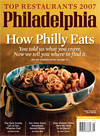Rendell Uncorks PA Wine Shipping Plan
The Philadelphia Inquirer reported today that Gov. Rendell has proposed legislation that would allow Pennsylvania consumers to have wine shipped directly to their door from out-of-state wineries. As part of the proposal, the wineries must collect PA’s 18% Emergency Tax (a/k/a/ the “Johnstown Flood Tax”).
This is a good plan.
The Inquirer article, however, implies that the glass is only half full. The article appears to express disappointment with Rendell’s proposal, stating that the “rub” is that the plan includes the consumer paying the 18% Johnstown Flood Tax on direct shipments. This apparent criticism is a bit unfair.
First, the Johnstown Flood Tax had to be part of the deal. In a Feb. 20, 2006 Inquirer article, Rendell said he “would support direct shipments of wine to Pennsylvanians if it can be done with minimal loss of state revenue.” He’s talking about the Johnstown Flood Tax. The state has been feeding from that teat for over 70 years. It ain’t letting go now, if ever. Rendell admitted that the state needs that money. So there was never going to be a direct shipping law that did not include the Johnstown Flood Tax. That’s the political compromise. If people want inexpensive wine, the PLCB has plenty of offerings in their stores. The people who are going to be ordering directly from wineries aren’t going to mind paying the taxes they’ve already been conditioned to pay in exchange for the ability (finally) to choose what to drink.
Second, Rendell’s proposal could have been worse:
- It could have banned direct shipments altogether. PA’s law was declared unconstitutional on Equal Protection grounds. Banning all direct shipments—from both in-state and out-of-state wineries—would have complied with the U.S. Supreme Court’s decision. Sadly, this is what some other states, such as Alabama, chose to do in response to the ruling. So, at least we’re not Alabama.
- It could have had the wine being shipped directly to state stores instead of your door. Proponents of this option argued that if direct shipment is allowed at all, the shipments must go directly to the state stores because (1) that’s the only way to collect the Johnstown Flood Tax; and (2) underage kids would be ordering wine. Both of these arguments have been debunked. Taxes can be collected through a license procedure, which is part of Rendell’s plan. That’s how other states have done it, and if you couldn’t figure that one out, you probably don’t deserve to be a state legislator. Also, other states haven’t had any problems with direct shipment leading to underage drinking.
- It could have made direct shipment even more expensive. My understanding is that if you want to order wine through the PLCB’s Special Liquor Order (“SLO”) process, they tack on a 30% mark-up in addition to the Johnstown Flood Tax. When Rendell signaled that the direct-shipping plan needed to be done “with a minimal loss of state revenue,” it was unclear how the 30% mark-up factored into the equation. If you could order directly from the winery, there would be no need to do an SLO, which would mean lost revenue for the state. While taxes can be collected from the out-of-state wineries through the permit process, the 30% mark-up may be a different story. So, my concern was that the proposal actually would include an increase to the Johnstown Flood Tax to make up for any anticipated loss in revenue from potentially not being able to collect the 30% mark-up. It didn’t. Be thankful.
But there may be a few bugs in Rendell’s proposal. It is not clear from the Inquirer article whether the proposal allows restaurants to order directly from out-of-state wineries. The article says that Pennsylvania wineries would lose their right to ship directly to restaurants. However, Kevin Joyce, the owner of the Carlton Restaurant in Pittsburgh and the president of the Pennsylvania Restaurant Association, implies that the ban extends to out-of-state wineries as well. If Joyce is correct, that could be a problem. First, it may raise further Equal Protection issues. Second, if out-of-state wineries can’t ship directly to restaurants, it could be a disincentive for out-of-state wineries to apply for direct shipping permits. And, ultimately, that could translate into consumers not having that many additional choices, which was the whole point of allowing direct shipment in the first place.












No comments:
Post a Comment